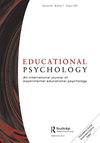Higher-education course characteristics relate to academic procrastination: a multivariate two-level analysis
IF 3.6
2区 心理学
Q1 EDUCATION & EDUCATIONAL RESEARCH
引用次数: 1
Abstract
Abstract Procrastination is a widespread phenomenon in higher education. Recently, specific aspects of the higher education course context have been theoretically linked to procrastination. Therefore, the aim of the present study was to integrate specific course characteristics (e.g., feedback structure, social norms, clarity of assignments), examine in which way they relate to procrastination, and if this relation can be explained by the satisfaction of basic needs for autonomy, relatedness, and competence. We conducted a multivariate two-level study with a sample of 90 courses with 1,809 students from different faculties and semesters. Results imply that academic procrastination is associated with specific course characteristics to a considerable degree. Basic need satisfaction was negatively related to academic procrastination at a medium level on both, the individual student level as well as the course level. Moreover, basic need satisfaction explained the relations between specific course characteristics and procrastination.高等教育课程特征与学业拖延的关系:多变量双水平分析
拖延是高等教育中普遍存在的现象。最近,高等教育课程情境的特定方面在理论上与拖延症有关。因此,本研究的目的是整合特定的课程特征(如反馈结构、社会规范、作业清晰度),研究它们与拖延症的关系,以及这种关系是否可以用自主性、相关性和能力的基本需求的满足来解释。我们进行了一项多变量双水平研究,样本为90门课程,来自不同院系和学期的1809名学生。研究结果表明,学业拖延症在很大程度上与特定的课程特征有关。基本需求满足与学业拖延在中等水平、学生个体水平和课程水平上均呈负相关。此外,基本需求满足解释了特定课程特征与拖延症之间的关系。
本文章由计算机程序翻译,如有差异,请以英文原文为准。
求助全文
约1分钟内获得全文
求助全文
来源期刊

Educational Psychology
Multiple-
CiteScore
6.40
自引率
6.20%
发文量
57
期刊介绍:
This journal provides an international forum for the discussion and rapid dissemination of research findings in psychology relevant to education. The journal places particular emphasis on the publishing of papers reporting applied research based on experimental and behavioural studies. Reviews of relevant areas of literature also appear from time to time. The aim of the journal is to be a primary source for articles dealing with the psychological aspects of education ranging from pre-school to tertiary provision and the education of children with special needs. The prompt publication of high-quality articles is the journal"s first priority. All contributions are submitted "blind" to at least two independent referees before acceptance for publication.
 求助内容:
求助内容: 应助结果提醒方式:
应助结果提醒方式:


